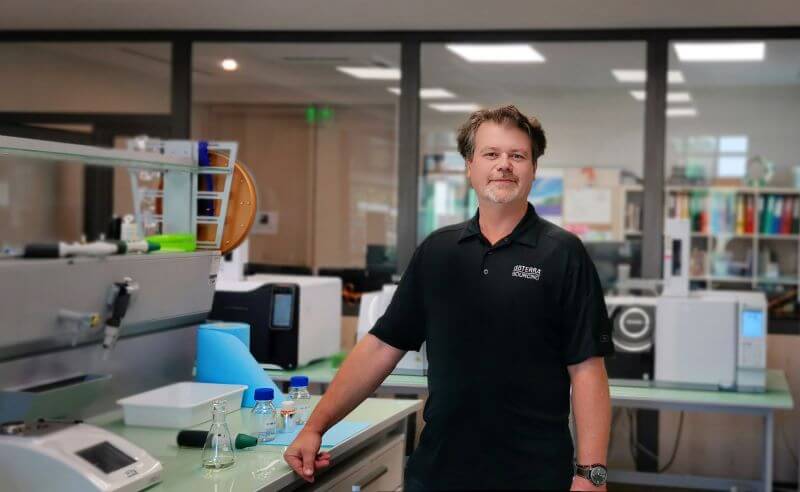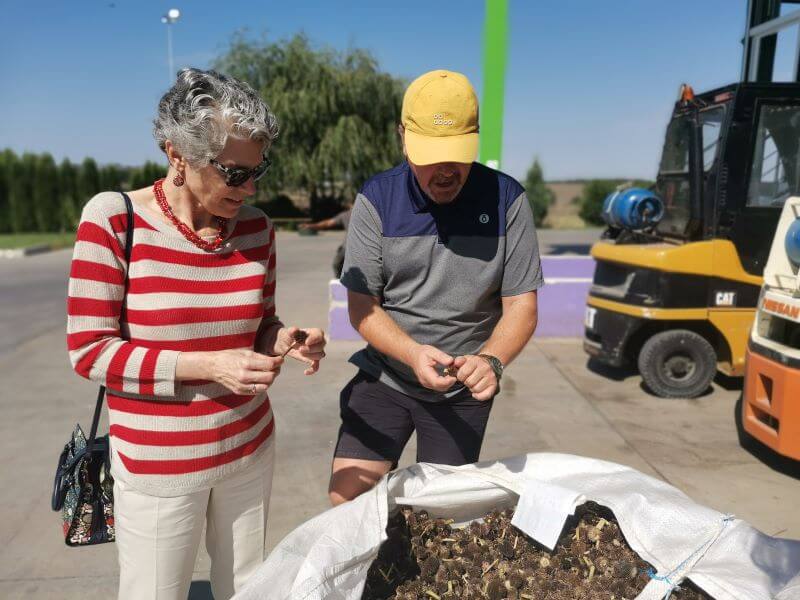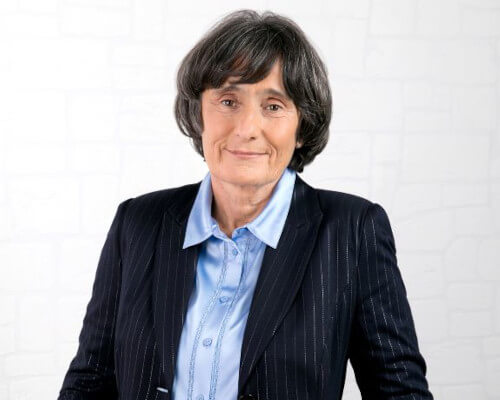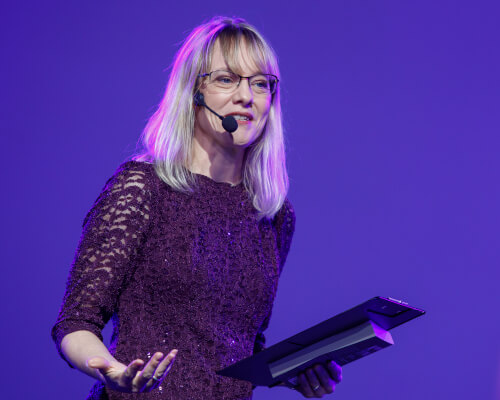
Plamen Nikolov likes to joke that he is in the business of diffusing wellbeing. He is the executive director of Esseterre, the Bulgarian arm of the world’s largest producer of essential oils, dōTERRA. Essential oils are aromatic oils distilled from plants and an essential ingredient in aromatherapy, the practice of using oils for healing or cosmetic purposes, usually through inhalation. Diffusers are devices used to disperse the beneficial scents.
Attracted by Bulgaria’s reputation as the world leader in lavender oil production and significant know-how in the field, US company dōTERRA initially planned to base some of its lavender and melissa oil production there. Since it founded Esseterre in 2015, however, demand for essential oils has soared: the global essential oils industry was estimated at $8.74 billion in 2020 and projected to increase to $18.25 billion in 2028, according to market research company Fortune Business Insights. Increased demand and Esseterre’s quality output prompted dōTERRA to expand its investments in Bulgaria.
Today, Esseterre is a 24/7, 365-days-a-year operation distilling frankincense, lavender, melissa, savory, sandalwood, myrrh, chamomile, and yarrow, among others, in its distilleries in the northeastern town of Dobrich. It also distills rose oil in the newly opened Terra Roza distillery in Shipka, near Bulgaria’s “rose capital,” Kazanlak. As a result, dōTERRA clients all over the world benefit from wellness and beauty products, food and beverages, and medical supplements made with oils distilled in Bulgaria.
It is more than just clients’ wellbeing that Plamen Nikolov is after. Esseterre is known as a company that cares for its people. Vendors get steady business, farmers enjoy fair prices and multi-year contracts, while employees benefit from career development programs and additional skills training. Plamen and his senior management have created a supportive environment at Esseterre, one that builds trust and empowers employees to make autonomous decisions and experiment.
The company’s approach is partially a product of necessity. Because of the around-the-clock nature of work at Esseterre, “it’s essential that you have people who are steady and responsible. I am happy to be surrounded by people like that,” Plamen says. But Esseterre’s HR approach is also motivated by a genuine care for people. “I believe in a team. I may not have many talents, but I am good at finding and motivating people. This is how you build a structure like ours: finding people who are eager, motivating them to want to grow in what they do, having them come to work with a smile.”
Plamen works hard to get his employees there. Some initial turnover among the unskilled workers at the plant, mostly people from local Roma communities, prompted him to spend more time understanding the communities’ challenges and assisting individuals in building the necessary work ethic and skills. In partnership with the Trust for Social Achievement, the company provided employees with an array of vocational courses during regular work hours as well as evening literacy classes to those who struggled with reading and writing.
“We believe that the skills they acquire while working with us will be useful. Even after they move on, this is something that they get to keep. We want to give them something that will improve their living standards and their value on the labor market,” he says.

The results are evident: today, there is little turnover among Esseterre’s 110 full-time employees, and in lavender and rose season the company relies on nearly 200 regular part-timers. Local families show their appreciation by inviting Plamen and the other senior managers to weddings and other family occasions.
“It all started with our owners. They are from the State of Utah, and for them it is a deeply ingrained practice to set aside a part of their income for public-benefit activities. They call it ‘giving back’ to society. Another one of their values we espouse is the so-called co-impact — that is, we take care of the area in which we are active,” Plamen explains.
In Dobrich alone, where Esseterre’s main distilleries are, the company has invested nearly 600,000 levs in local initiatives over five years. These include improving living conditions for children without parental care, launching a mentorship and apprenticeship program for young adults leaving institutions, funding the construction of children’s playgrounds in town, and supporting the restoration and purchase of new equipment for a popular local children’s food kitchen.
Plamen speaks with admiration for the work of the Wonder Garden, a local project supporting disabled individuals, and the woman who started it all, Mariya Metodieva. The Wonder Garden is an urban farm that provides a livelihood and a dignified life for 22 young adults with disabilities as well as fresh produce for all of Dobrich. Esseterre helped the Wonder Garden purchase a storage facility, water tanks, a tractor, and a vehicle to make deliveries. “Mariya and her partner are wonderful people. They have a cause that’s changing the world,” Plamen says.
In Shipka this year, Plamen supported the launch of Rose Academy, a week-long summer school where talented young musicians from across Bulgaria practice their art under the mentorship of experienced teachers. “It’s important for kids in musical schools to play in an orchestra, in front of an audience. The second goal of the Academy is to provide people from small places with access to high art,” says Plamen, who is a passionate, lifelong admirer of classical music. The inaugural edition of what Plamen hopes would become an annual event featured renowned conductor and music teacher Maxim Eshkenazy.
Plamen’s participation in another first edition, that of BASE Mentor, shows how seriously, and personally, he takes giving back. Through this program, graduates of Business Academy for Starting Entrepreneurs, the America for Bulgaria Foundation’s free entrepreneurship program, receive additional support and practical tips from business veterans to improve and expand their small businesses. To date, Plamen has mentored two young women who started online retail stores. “My wish was to drive home the importance of valuing their own labor and time,” Plamen says, adding that selling themselves short seems to be a general problem for people in Bulgaria.

The country’s cultural heritage is another area that appeals to his sense of civic responsibility. By his own admission, he was left speechless when he first visited the Visitor Center of the Bishop’s Basilica of Philippopolis in Plovdiv. “When I saw what design decisions were made, how the two mosaic layers were exhibited, and how wonderful the whole thing was, I was so captivated that I had to support it with what I could. This is a great treasure for Plovdiv and Bulgaria,” Plamen says. He joined dozens of other individuals and businesses in raising funds through the Adopt a Bird campaign to support the long-term functioning of the Basilica complex and its community programs. His choice of bird was Scarlet-Neck because “I was a redhead as a child,” he says, laughing, but also because red is the color of happiness and wellbeing.
What powers his optimism?
“I’ve seen good things in life. Of course, I have also experienced bad things, but I prefer seeing the glass as half full. I really believe that a person has to make an effort — to roll up their sleeves and act,” he says.
He gives his own story with Esseterre as an example. Plamen is part of the team from the get-go, one of his first tasks being the construction of a distillery in Dobrich. “Building a distillery is somewhat unconventional. No textbook exists on how to build one, but when dōTERRA asked me if I could do it, I said, ‘Yes, I can.’ If someone else did it before me, I could do it too.”
How does he know he is successful?
“When people’s lives change for the better.”

